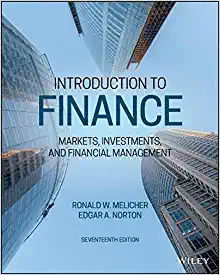Answered step by step
Verified Expert Solution
Question
1 Approved Answer
1) At an output level of 17,000 units, you have calculated that the degree of operating leverage is 2.20. The operating cash flow is $64,000
1) At an output level of 17,000 units, you have calculated that the degree of operating leverage is 2.20. The operating cash flow is $64,000 in this case. Ignoring the effect of taxes, what are fixed costs? Fixed costs $ __________ What will the operating cash flow be if output rises to 18,000 units? (Do not round intermediate calculations and round your final answer to 2 decimal places. (e.g., 32.16)) Operating cash flow $ ___________ What will the operating cash flow be if output falls to 16,000 units? (Do not round intermediate calculations and round your final answer to 2 decimal places. (e.g., 32.16)) Operating cash flow $ __________ 2) A proposed project has fixed costs of $102,000 per year. The operating cash flow at 4,900 units is $96,400. Ignoring the effect of taxes, what is the degree of operating leverage? (Round your answer to 4 decimal places. (e.g., 32.1616)) Degree of operating leverage ____________ If units sold rise from 4,900 to 5,400, what will be the new operating cash flow? (Do not round intermediate calculations and round your final answer to 2 decimal places. (e.g., 32.16)) Operating cash flow $______________ What is the new degree of operating leverage? (Do not round intermediate calculations and round your final answer to 4 decimal places. (e.g., 32.1616)) DOL _________________ 3) At an output level of 58,000 units, you calculate that the degree of operating leverage is 1.60. Suppose fixed costs are $120,000. What is the operating cash flow at 52,000 units? Operating cash flow $ __________ What is the degree of operating leverage? (Do not round intermediate calculations and round your final answer to 3 decimal places. (e.g., 32.161)) Degree of operating leverage _______________ 4) At an output level of 62,000 units, you calculate that the degree of operating leverage is 3.70. The output rises to 67,000 units. What will the percentage change in operating cash flow be? (Round your answer to 2 decimal places. (e.g., 32.16)) Percentage change in OCF _____________ % Will the new level of operating leverage be higher or lower? ___________ Higher Lower 5) Consider a project with the following data: accounting break-even quantity = 16,000 units; cash break-even quantity = 15,000 units; life = six years; fixed costs = $180,000; variable costs = $36 per unit; required return = 12 percent. Ignoring the effect of taxes, find the financial break-even quantity ____________ 6) We are evaluating a project that costs $500,000, has an eight-year life, and has no salvage value. Assume that depreciation is straight-line to zero over the life of the project. Sales are projected at 50,000 units per year. Price per unit is $40, variable cost per unit is $25, and fixed costs are $600,000 per year. The tax rate is 35 percent, and we require a 12 percent return on this project. Suppose the projections given for price, quantity, variable costs, and fixed costs are all accurate to within 10 percent. Calculate the best-case and worst-case NPV figures. (Negative amount should be indicated by a minus sign. Do not round intermediate calculations and round your final answers to 2 decimal places. (e.g., 32.16)) NPV Best-case $ __________________ Worst-case $ ____________________
Step by Step Solution
There are 3 Steps involved in it
Step: 1

Get Instant Access to Expert-Tailored Solutions
See step-by-step solutions with expert insights and AI powered tools for academic success
Step: 2

Step: 3

Ace Your Homework with AI
Get the answers you need in no time with our AI-driven, step-by-step assistance
Get Started


